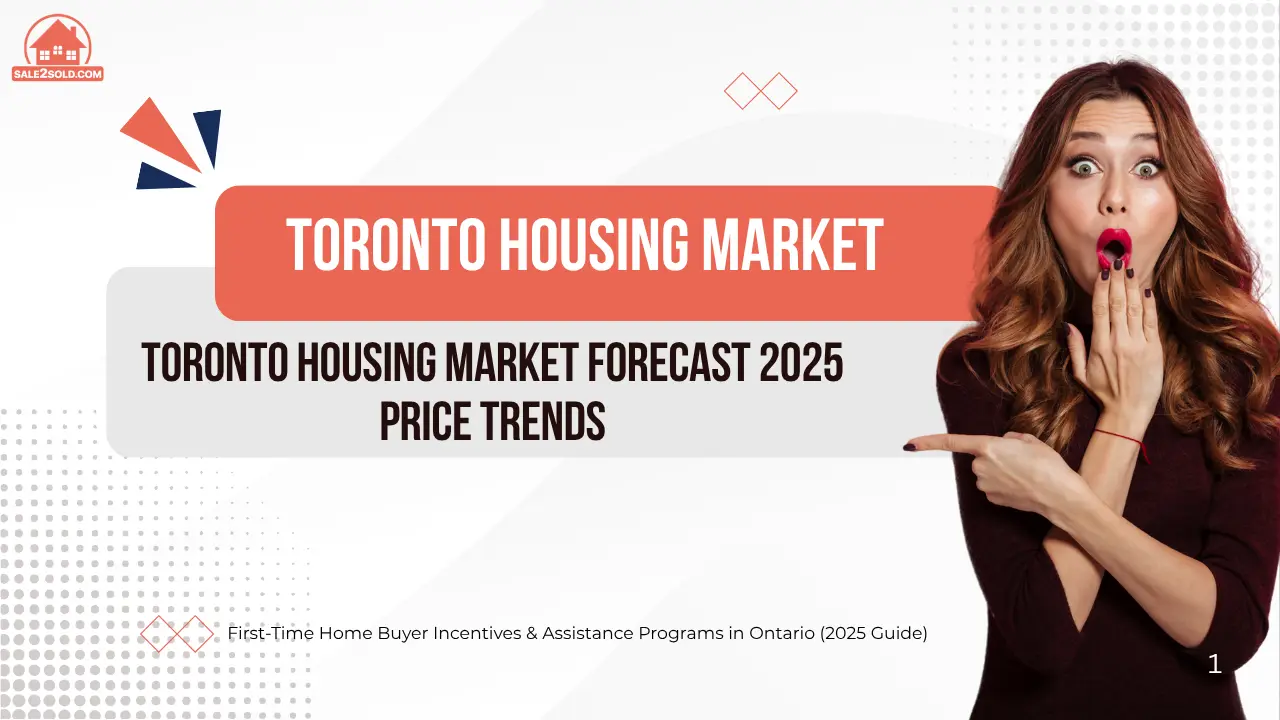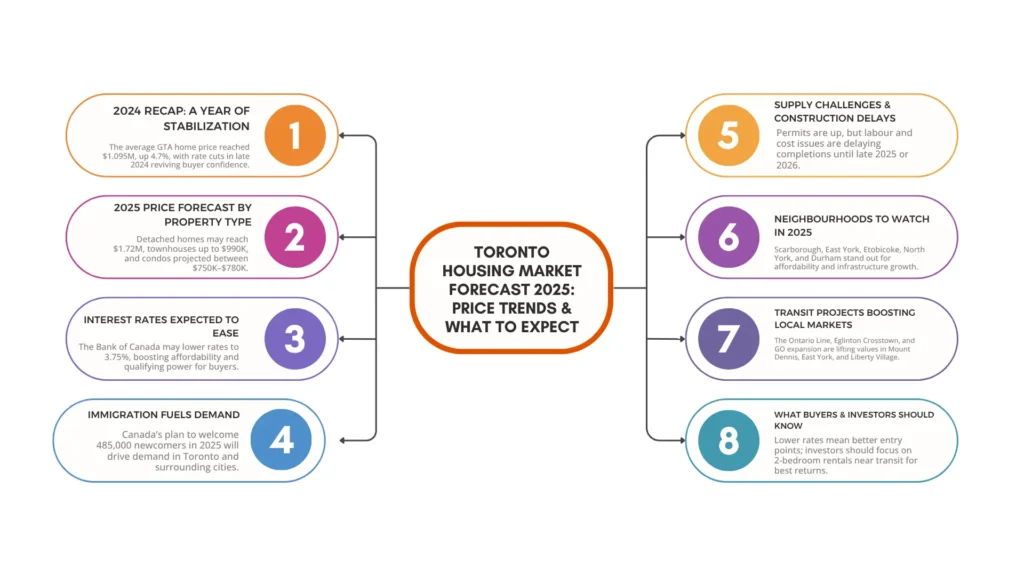Toronto Housing Market Forecast 2025 | Price Trends


Toronto remains the most active real estate market in Canada, and its direction in 2025 will be shaped by key factors like interest rates, immigration levels, infrastructure development, and housing supply. While 2022 and 2023 were marked by high volatility and uncertainty, 2024 brought some much needed stability. Now, 2025 is poised to deliver moderate yet consistent growth, with some localized surges in both demand and pricing. The Toronto Housing Market Forecast reflects these evolving dynamics and highlights opportunities emerging throughout the city and surrounding regions.
This forecast breaks down where the market currently stands, where it’s heading next, and which neighbourhoods are becoming increasingly important for both buyers and investors seeking value and long-term growth. The Toronto Housing Market Forecast for 2025 offers essential guidance for navigating these shifts with confidence.
Table of Contents
ToggleTo understand what’s ahead in 2025, we must first examine how 2024 concluded. This baseline provides the necessary context for interpreting future projections and planning effective real estate strategies.
According to the Toronto Regional Real Estate Board (TRREB), the average home price in the Greater Toronto Area (GTA) in December 2024 reached approximately $1,095,000, which represented a 4.7% year over year increase. Despite economic headwinds earlier in the year, the market regained momentum during the second half of 2024. Here’s how different housing segments performed:
Detached Homes: Averaged $1.6 million in Toronto proper slightly higher than $1.55 million in 2023, indicating steady appreciation in the luxury and family segments.
Townhouses: Continued rising in popularity due to affordability concerns, with average prices climbing to $925,000. This reflects a growing demand for low rise housing in emerging neighborhoods.
Condos: Showed flat to mildly positive growth, with average values reaching $730,000 depending on location, amenities, and proximity to transit infrastructure.
Sales volume notably improved in the second half of 2024. This uptick followed a series of interest rate reductions by the Bank of Canada. By year end, the key overnight rate had settled at 4.25%, down from a mid 2023 peak of 5%. These lower borrowing costs renewed buyer interest, particularly among first time homebuyers and previously sidelined move up buyers. According to the Toronto Housing Market Forecast, this renewed energy is expected to carry into 2025.
However, new listings remained relatively scarce, with only a slight year over year increase. Active inventory levels stayed below pre-pandemic norms, keeping competition fierce in many high demand neighborhoods. The Toronto Housing Market Forecast considers this constrained supply one of the primary forces behind expected price resilience in the coming year.
Analysts are generally aligned in predicting moderate price growth across most major housing categories in Toronto during 2025. Although appreciation is not expected to be dramatic, the Toronto Housing Market Forecast points to a stable trajectory with some neighborhoods outperforming the average due to demand concentration, affordability gaps, and transit infrastructure.
| Housing Type | 2024 Avg Price | 2025 Projected Avg | Projected Change |
|---|---|---|---|
| Detached Home | $1,600,000 | $1,680,000 to $1,720,000 | +5% to +7.5% |
| Semi-Detached | $1,200,000 | $1,260,000 to $1,290,000 | +5% to +7% |
| Townhouse | $925,000 | $965,000 to $990,000 | +4% to +7% |
| Condo Apartment | $730,000 | $750,000 to $780,000 | +2.5% to +6% |
These projections draw from expert data sources, including CMHC, RBC Economics, and Scotiabank. The Toronto Housing Market Forecast for 2025 anticipates a more balanced market where affordability, regional differences, and inventory levels dictate pricing trends.
The Bank of Canada is expected to further reduce interest rates in mid-2025, possibly lowering the overnight rate to 3.75%. This would significantly improve affordability for both new buyers and those seeking to refinance. Lower rates may also ease stress test requirements, increasing loan qualification limits. These changes, as highlighted by the Toronto Housing Market Forecast, would help bolster purchasing power and market participation.
Immigration remains a dominant factor in shaping demand. Federal targets for 2025 include over 485,000 newcomers, with a large proportion expected to settle in Ontario particularly in the GTA. This wave of new residents will intensify demand for both rentals and homeownership. The Toronto Housing Market Forecast expects this demographic pressure to particularly affect high density and mid-priced housing segments.
Zoning reforms in 2023 to 2024 allowed for more density on single family lots, driving a surge in multi unit building permits. However, delays due to labor shortages and supply chain issues have slowed completion timelines. Many projects initiated in 2023 are now expected to be ready by late 2025 or 2026. This lag, as noted in the Toronto Housing Market Forecast, will continue to restrict inventory in the near term.
Rents are rising rapidly. The average rent for a 1 bedroom in Toronto was $2,650/month in Q4 2024, marking a 9% year over year increase. With demand expected to grow further in 2025, more renters may consider entering the ownership market. The Toronto Housing Market Forecast sees this shift as a potential accelerant for entry level home sales, particularly in condo markets.
Projects such as the Ontario Line, Eglinton Crosstown West Extension, and GO Expansion are changing the dynamics of urban growth. Areas like East York, Mount Dennis, and Liberty Village are poised for significant price gains. The Toronto Housing Market Forecast anticipates that these transit accessible zones will outperform the broader market due to enhanced liveability and connectivity.
Not all areas in Toronto will experience equal growth. According to the Toronto Housing Market Forecast, several neighborhoods stand out based on their affordability, upcoming infrastructure, and buyer demand.
Scarborough: Long undervalued, Scarborough is seeing renewed interest due to LRT expansion and newer condo projects. Detached homes under $1.2M are still widely available, making it a family friendly market.
Etobicoke: Growth in condo developments near Kipling and Islington stations is attracting both end users and investors. Etobicoke’s property values continue to rise, supported by newer housing stock and access to the lakefront.
East York: Infrastructure improvements from the Ontario Line are drawing young families and professionals to neighborhoods like Danforth Village. Home prices remain more attainable compared to nearby downtown neighborhoods such as Riverdale.
North York: High rise and mixed-use developments are increasing around Sheppard and Yonge. Proximity to transit and employment hubs keeps demand strong.
Durham Region: For those priced out of central Toronto, Durham remains a top alternative. Areas like Pickering and Oshawa offer affordability and GO Train access, supporting ongoing price growth.
More mortgage flexibility is on the horizon. Fixed rate options below 5% are likely by late 2025.
Competition in low inventory neighborhoods will remain tight.
First time buyers should leverage tools like the First Home Savings Account (FHSA), Land Transfer Tax Rebates, and Shared Equity Incentives.
Waiting for a major market correction may not pay off focus on aligning purchases with rate trends and seasonal listing patterns.
Rental demand is strong particularly for 2 bedroom condos near transit.
Gross yields of 4% to 5.5% are achievable in select areas.
Holding for 3 to 5 years aligns with expected value appreciation from transit projects.
Be cautious of rising condo maintenance fees due to inflation and aging infrastructure.
The Toronto Housing Market Forecast recommends that investors closely monitor budget performance and building health when selecting units.
Although the Toronto Housing Market Forecast maintains a positive outlook, it also highlights several potential risks:
A recession or employment shocks in sectors like tech or finance
Government policy shifts, such as expanded rent control or new taxes on investment properties
Mortgage renewal risk, especially for owners coming off ultra low 2020 rates
Global issues such as commodity volatility, geopolitical instability, or U.S. market shifts
These risks may temporarily impact activity but are not expected to reverse long term upward trends in Toronto.
Toronto’s housing market in 2025 is set for a steady and moderately optimistic year. Prices are forecast to rise moderately, interest rates are expected to ease further, and strong population growth will continue to support underlying demand. According to the Toronto Housing Market Forecast, neighborhood specific growth will depend largely on transit access, inventory levels, and affordability.
Buyers should anticipate heightened competition during the spring and fall markets. Meanwhile, investors may find compelling opportunities in under the-radar areas near upcoming infrastructure. Continued monitoring of zoning changes, rate cuts, and immigration policy will be essential for staying ahead in this evolving market. The Toronto Housing Market Forecast suggests 2025 will reward strategic, well-informed decision making in all housing segments.